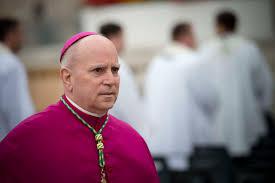|
Denver Archbishop Aquila Appears to Downplay New Catholic Church Abuse Cases
By Madeleine Schmidt
Colorado Times Recorder
December 04, 2020
https://coloradotimesrecorder.com/2020/12/denver-archbishop-aquila-appears-to-downplay-new-catholic-church-abuse-cases/32966/
 |
Following the release of a report this week on the history of child sexual abuse at the hands of Colorado Catholic priests that identified dozens of new survivors and nine new perpetrators, Denver Archbishop Samuel Aquila seemed to once again downplay the severity of the abuse.
The supplemental report released Tuesday by the Colorado Attorney General’s office was a follow up to a report on clergy sexual abuse released last year. Tuesday’s report, which concludes a 22-month investigation into how Colorado’s three Catholic dioceses sheltered abusers over seven decades, identified an additional 46 abuse survivors and nine priests that came to light since the release of the first report.
Those cases include the late Rev. Charles B. Woodrich, known as Father Woody, who has long been touted by the church as an icon for altruism toward Denver’s homeless population, and Father Joe Walsh, who sexually abused children living at the Sacred Heart Orphanage in Pueblo.
In a letter published on the Denver Archdiocese’s website, Aquila seemed to diminish the severity of these new findings, underscoring the fact that in Colorado’s 212 documented abuse cases involving 52 priests, “over 85 percent of the incidents occurred more than 40 years ago,” and that “nearly half of the total incidents were committed by one man, Harold White.”
Aquila also wrote in bolded letters that there are “no substantiated allegations against any current priest in active ministry” and that “this extensive, independent process should remove any cloud of unfair suspicion from our current priests.”
“I offer no excuses for these sins of the past, or the historical failure to respond to allegations against Harold White and others, but the context of when the abuse happened is important,” Aquila wrote.
He began the letter by addressing fellow Catholics who were disheartened, not because of the church’s dark history but “because there was a feeling that this issue had been addressed, so despite no current cases, why was it back in the news?”
“The reality is that even though we have spent decades taking steps to make sure our children are protected and that survivors are cared for, the healing process remains on-going and the work continues,” he added.
Aquila did, however, express his hope that the process brought about healing for survivors.
“While I cannot speak for every survivor, my hope is that this process has served them in their healing,” he said. “I know that for many, having to relive any aspect of their abuse was extremely painful, but I hope that the listing of names provided a measure of vindication by publicly acknowledging the horrible wrongs that were committed.”
The report details how for over half of the 212 children who were abused, the church was perviously aware of abuse allegations against the priest who abused them.
“Specifically, these incidents provide further evidence that historically the dioceses enabled clergy child sexual abuse by transferring abusive priests to new parishes; taking no action to restrict their ministry or access to children; concealing the priests’ behavior with secrecy, euphemism and lack of documentation; silencing victims; and not reporting the abuse to law enforcement,” wrote investigator Bob Troyer in Tuesday’s report.
It’s not the first time that Aquila has seemingly downplayed the severity of the church’s history of sexual abuse.
Following the release of the attorney general’s initial report in the fall of 2019, Aquila apologized to the survivors, but then went on to say that “perpetrators infect every organization,” a comment that advocates said minimized the church’s history of sheltering abusers.
Aquila, who’s been outspoken in his anti-LGBTQ beliefs, also tweeted an article in 2018 with the headline, “Active Homosexuality in the Priesthood Helped Cause This Crisis.”
The Denver, Pueblo, and Colorado Springs Dioceses paid $7.3 million to survivors as part of an agreement with the Attorney General’s office. No criminal proceedings have taken place in Colorado because of the state’s statute of limitations for child abuse cases or because the alleged abuser has died.
Following recommendations laid out by the attorney general in the first report, Colorado’s three Catholic dioceses committed to putting in place independent investigation systems, providing for victim-assistance coordinators, and improving records management to facilitate reporting incidents to law enforcement.
“I am pleased that all of the dioceses in Colorado implemented every recommendation in the first report, and the reforms they have made appear to be meaningful and sound. But as the report points out, these improvements are untested at this point in time, and it will be up to the church to ensure it is creating an environment that is as safe as possible for children now and in the future,” said Attorney General Phil Weiser in a press release.
There have, however, been delays in the church reporting new allegations to law enforcement.
As reported by KRDO, the Pueblo diocese received an abuse claim in February of this year against Monsignor Marvin Kapushion, but didn’t report that claim to police until April of 2020, two weeks after the priest died.
|
